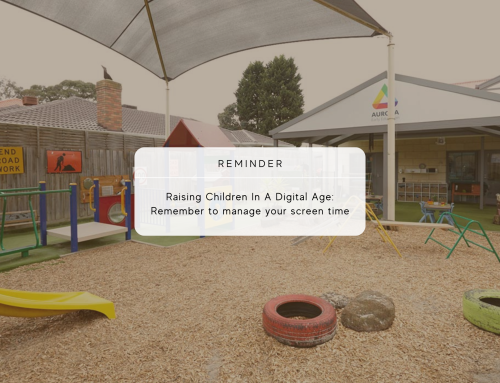Aurora Kindergarten believes in constantly enhancing the environment our children are in and increasing their understanding of virtues and self-help skills in a variety of ways through our program and curriculum. One of the ways we instil these morals and values is through our virtue of the month which we incorporate into our curriculum learning outcomes.
This month’s virtue is patience. At Aurora Early Education in Doncaster, QV, and Rowville, we encourage all our children and staff to be patient by ensuring that they seize any opportunity to detach from feelings of aggression and angst, come to stillness, and take on a more calm attitude towards any situation. Doing so helps all of us identify our emotions in the moment, think about how we really feel and then tackle the situation.
What does being patient look like?
Commonly, being patient is viewed as holding in emotions, thoughts, and actions in various instances and not responding to actions directed at or around you. Although that is somewhat true, it does not entirely mean we hold in feelings and never express them. Instead, we encourage all to take a moment, think about how they really feel, assess the situation, and then express their true thoughts in a calm and understandable manner so the other party is able to take it in the right way as opposed to blowing it out of proportion.

In essence, we at Aurora Early Learning Centre want to teach our children to accept the way in which certain situations unfold, tolerate, and delay their reactions to avoid becoming overly annoyed or anxious. This way, we are able to hear the other party out, try to understand where they are coming from, process the issue at hand, and tactfully try to aid the situation.
How do we incorporate it into our curriculum?
All the centres of Aurora Early Education in Melbourne CBD, and Rowville are committed to ensuring that our children contribute to the world around them and understand their rights and responsibilities as members of the community. Therefore, to successfully contribute to the community, they must have the ability to be patient and intelligently make their next move.
The activities our children participate in at our centres requires them to mentally make assessments when interacting with challenges. Our learning-through-play approach equips our children with the right skills to deal with and overcome various challenges and take away a valuable lesson from each instance. Moreover, teaching children to recognise the emotions of others can support their ability to be patient when faced with various conflicts.
What are the best ways to teach patience to a child?

It is important that we as adults, educators, parents or guardians also practice what we preach. Therefore, if we want our children to be patient, we must practice it daily so they learn from our examples.
Another way we can teach our children to be patient is through group activities and games, where they learn to wait their turn and share resources with others. Additionally, following routines also aids in our children becoming more patient as through this they learn that there is a specific time allocated to an activity. Hence, if they want to do something earlier, their routine will indicate that they have to wait till the right time, complete their other tasks, and then get to that activity.
Reading children’s story books or watching children’s programs about practising patience is also very helpful in showing children the different scenarios in which they can be patient and how they can do it.
As the old adage goes, patience is ultimately a virtue; it is a good quality to have for any instance and we must all learn to be more patient and help a situation rather than aggravate it further.





